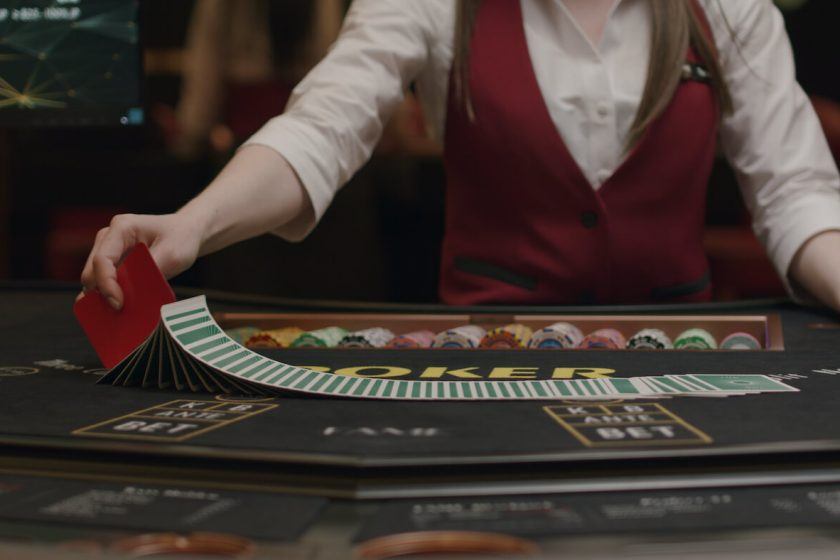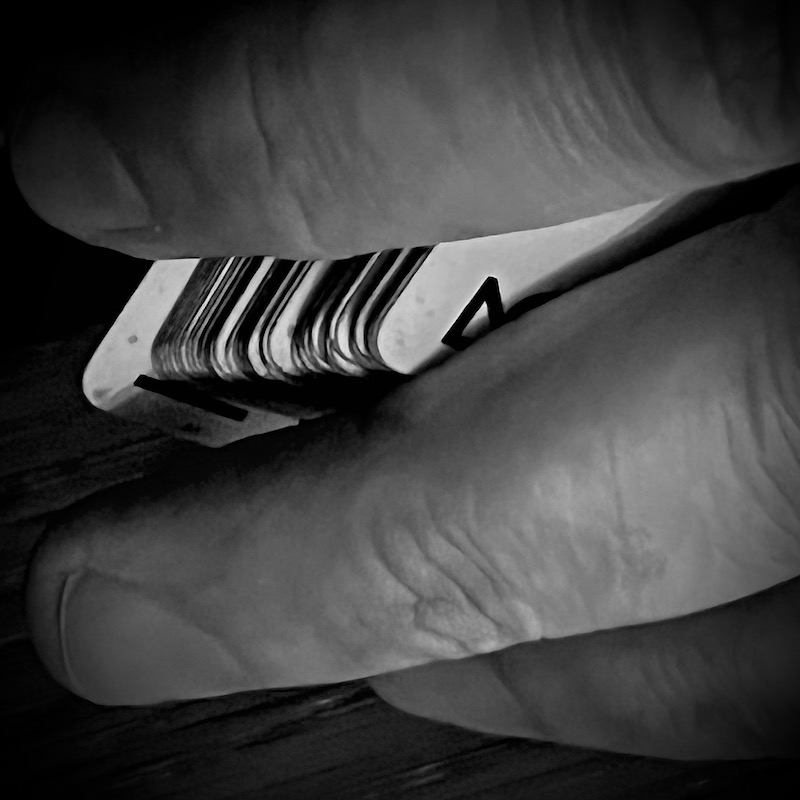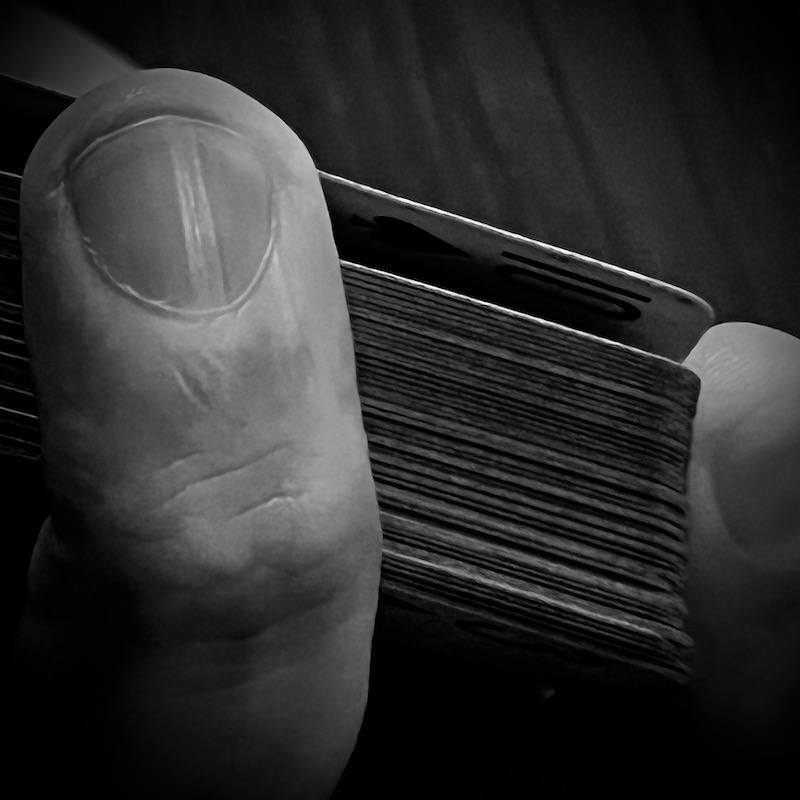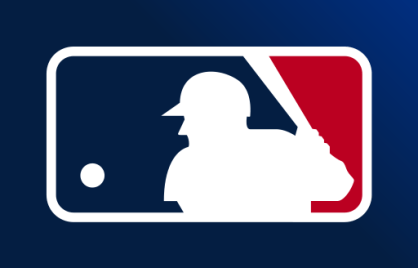R. Paul Wilson On: How Dealers And Players Can Work Together To Steal From The House

The peek is a powerful tool for crooked card players and can be used to steer valuable cards to one’s own hand or damaging cards to an opponent.
In games like high/low a strong, undetectable peek is like having a marked deck anywhere, anytime but in casino table games, the peek can be much more profitable.
I spoke previously about how cheaters can glimpse their own cards as they deal but in table games, a crooked dealer can “send” the top card or even multiple cards from known locations deeper down to players who use that information to have an unbeatable edge.
How “Flashing” Works
Hand dealt games have always been vulnerable to “flashing” where the dealer allows an outside agent to get a peek of what’s coming and act/bet accordingly.
Imagine playing blackjack for hours and often knowing the first card you will be dealt, or potential hit cards in the middle of a hand?
Such information would allow you to increase and decrease your bets based on the predicted value of your hand plus make some seemingly risky hits that are certain to make your hand.
The mechanics of this kind of player/agent scam are not difficult to learn but timing is a factor that can only be learned in practice.
Many scammers have played for years without detection by mastering how and when to flash cards to multiple “takeoff men.”
Perhaps the most powerful “flash” was accomplished by pushing the top card very slightly off the deck so part of the index of the top card would be revealed between the fingers of the right hand.

As the dealer picked up a completed round of cards or peeked at their hole card (or any typical dealing action) they could easily expose the next card.
The entire index was not necessary to show; Just a hair on the edge of the index would be enough to know if it was a 10-value or an Ace.
And if you spend a few minutes trying this yourself, you’ll quickly realize that any value can be recognized by a slither of its left-most edge.
This move may sound pretty blatant, but it can work for months or years without ever being detected, and several crews of dealers and players were caught only after years of skimming cream from the house.
Most likely, countless more have never been suspected because the move is incredibly hard to see unless you are being the flashed the card and the eye in the sky has almost no chance unless the card is moved too much and without a covering action.
Method Variations
The method used to flash often dictates where the takeoff man (or woman) would sit but clever cheaters bounced the flash around the table to further conceal their actions.
Pit bosses, security and the eye in the sky might try to see how a winning player might get cards flashed by the dealer and fail to see any possible glimpse because the flash was being sent to another player on the opposite side of the table who then signaled the information to the takeoff man making the big bets.
One such flash is accomplished by raising the top card just enough so a player to the dealer’s right can catch a peek as cards are dealt or guarded (some casinos teach dealers to hold the deck against their chest between deals, making several flashes possible).
In some places, dealers would deal the deck from a position almost at eye level so players could catch a glimpse of cards beneath those being dealt if the dealer had mastered a method to push one card out very slightly under another in the action of dealing.

All of these methods are relatively simple but when mastered and used carefully, they could steal hundreds of thousands from a casino without anyone being the wiser.
Unfortunately (for the cheaters) one of the smartest ways to use this is for a dishonest dealer to use multiple takeoff players so their bosses never see a pattern of player/dealer winning streaks.
But this strategy has a fatal flaw: The more people who know about your scam, the more chances someone will talk or trade that information to beat some other charges.
Another powerful strategy employed by these cheaters was to steer high cards to the dealer’s hand in order to bust the dealer and pay off the entire table.
This can be an easy way to make a lot of money if the cheaters have the table “locked” (every player is in on the scam) but it further exposes the crew when so many players are needed.
Before The Machines
Hand shuffling (without a shuffling machine) offered crooked dealers and their partners many opportunities to create memorized slugs of cards that could be dropped into play at a known point then used to fleece the house for one or two rounds of play.
I know of several shuffling procedures that were vulnerable to dealer/player scams where one player would sit on third base as six or eight decks were being shuffled, carefully watching the top of each stack as they were being interlaced with other cards.
From this position, the player could see a small number of cards that were dropped onto the top of the shuffled stack and memorize those cards.
Thanks to the prescribed shuffling procedure, the dealer would shuffle cards together from two larges stacks, each made up of half the decks being played.
By grabbing cards from each of the initial stacks, the dealer created a third stack that would grow until it consisted of all eight (now shuffled) decks.
What made the flash possible (and incredibly profitable) was that the dealer had to carry back a deck from the shuffled stack and then shuffle that with cards from either of the two initial halves of the eight-deck stack.
This carry-back rule seemed to shuffle the cards even more, but it allowed a crooked dealer to keep cards on top of the shuffled stack throughout the entire shuffle!
Initially, this might have been a good way to keep a memorized slug but there’s always a chance that playback (recordings from security upstairs) might reveal that a sequence of cards was repeated after a shuffle so instead, the cheaters simply flashed cards that went to the top of the shuffled stack and kept them there.
The player on third base would memorize the cards then calculate which hands to bet on for a surefire win or, more practically how to make sure the dealer busted.
With a locked table, crews could clean out the chip tray but too much and too soon will get the attention of the eye in the sky so smart teams balanced their surefire rounds with multiple rounds of honest play between shuffles.
There’s a lot more to this than I can share here and in fact, a crooked dealer capable of executing some clever shuffle strategies can reap a lot more with another scam I’ll discuss in the future.
Many of these methods are long dead in places that use shuffle machines but those devices are far from perfect and there are other ways of beating a machine either with technology or something surprisingly simple.
What’s for sure is that scams that seem to be killed off by modern technology often evolve and return with a new angle that beats whatever precautions the casino thinks it has.
If The Shoe Fits
Flashing or peeking doesn’t always happen when the cards are being shuffled or dealt from a dealer’s hand.
Special dealing shoes have been made to allow a glimpse of the next card to either dealers or players depending on the construction of a secret device that transmits that information without any electronics or moving parts!
We’ll talk about gaffed shoes another time but let me leave you with this: Some entirely legitimate dealing shoes could allow dealers to peek or flash the next card and completely crush the game of blackjack.
This is not a dealing shoe that has been tampered with in any way but an entirely legitimate piece of gaming equipment found in hundreds of casinos yet vulnerable to one of the simplest and most devastating scams in the casino industry.
More on that in a later article.


